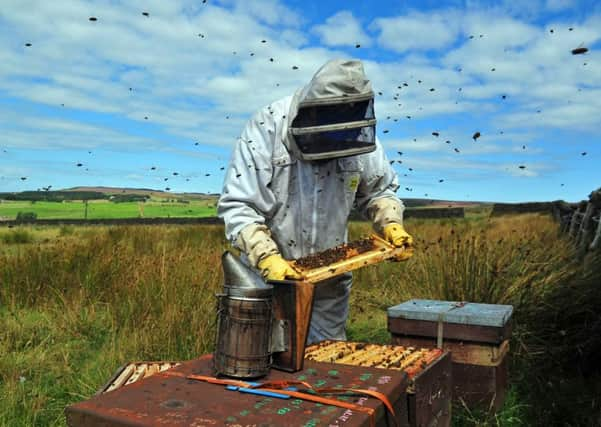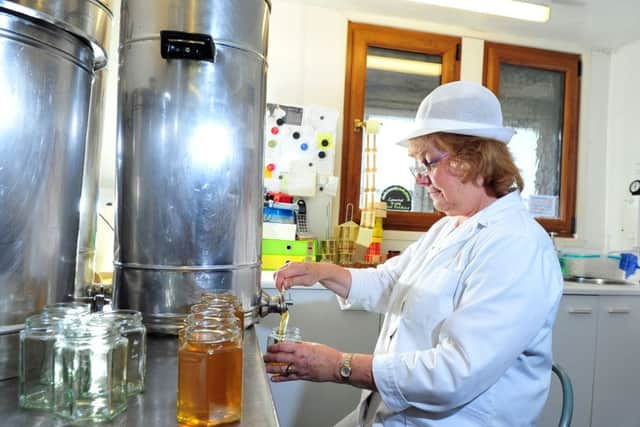Off to work, armed with a swatter


LIZ Joyce stealthily tracks a bee in her honey room with a long-handled, hand-shaped swatter, and dispatches it with a couple of hefty thwacks. On the face of it, it’s an odd thing to do for somebody who makes her living out of honey, killing one of the millions of bees that produce it, but Liz isn’t taking any chances.
That’s because a single sting could kill her. It nearly happened 11 years ago, when a sting brought her within minutes of death, an extremely severe allergic reaction tightening her throat until she was fighting for breath and had to be rushed into hospital. Ever since, she has undergone specialist anti-allergy treatment, but every day holds the threat of being stung.
Advertisement
Hide AdAdvertisement
Hide AdShe’s surrounded by bees. The honeycombs that Liz’s husband, Mike, brings in might have dozens in them, and swarms are attracted to their home at Denholme Gate, near Bradford, by the aroma of honey from the room where it is extracted and bottled for sale.


And just to underline the quirky predicament that Liz – known to her customers as the Honey Lady – finds herself in, she doesn’t like honey.
Not that it gets her down. Liz, 57, bubbly and extrovert, sees the funny side of her allergy as well as in being married to a man who is obsessed by beekeeping. “He’s got a death wish for me,” she says, to which Mike responds: “I want to claim the insurance.”
But there was nothing remotely funny about the day when she was driving and spotted a bee on the floor of the car next to the couple’s dog. Liz stopped and used a cassette-tape case to capture the bee to prevent it stinging the dog.
Advertisement
Hide AdAdvertisement
Hide AdAs she tried to drop it out of the window, it fell onto her leg and stung her.
Liz said: “By the time I got to the crossroads, my nose was running, then my eyes, and then they dried up and my throat dried up, and I thought: ‘This is really not good,’ so I drove to the doctor’s in Thornton, but by the time I got there I could scarcely breathe or walk, went in and managed to say: ‘I’ve been stung’ and keeled over.”
The doctor gave her an anti-allergy jab and oxygen, and she was taken to Bradford Royal Infirmary, where she was kept in overnight.
“I was told that I was eight minutes from dying,” said Liz. “Bit scary, that. I told the doctor that we make honey, and he said: ‘Thought about taking up jam?’”
Advertisement
Hide AdAdvertisement
Hide AdShe was referred to St James’s Hospital in Leeds for immune therapy, which involves being injected with bee venom, weekly at first, but now every six weeks.
“Because I’m still high risk I’m still going 11 years later, which is much longer than anyone else there, but I daren’t stop the injections,” said Liz.
Mike, 63, rushed from the school where he was headteacher to hospital when Liz was stung. “I was very upset. I went straight down to the hospital and her face was puce and I was really scared. We came home, we sat here and said: ‘Should we just stop?’, and typical Liz, she said: ‘No, let’s see if there’s a way round it.’”
There was. Since then, their business, Denholme Gate Honey, has gone from strength to strength. It is now one of Yorkshire’s leading honey producers, with more than 100 outlets, among them National Trust shops and Fodder, the farm shop at the Great Yorkshire Showground in Harrogate.
Advertisement
Hide AdAdvertisement
Hide AdEven so, the swatter has to be kept handy in the honey room. “It’s not the flying ones, it’s the ones sitting on the edge of a jar that scare me,” said Liz. “You can see the flying ones, but if there’s one settled on a jar and I pick it up, it’ll sting me and that does scare me.
“I don’t like having bees in the garden, but we get swarms of their own accord, because they’re attracted to the smell of the honey.”
But if Liz is wary of bees, Mike has been fascinated by them for the past 38 years. “I’m totally obsessed,” he said. “The longer I keep them, the less I know. They are so clever.”
The obsession started when he was teaching on the Isle of Wight in 1976 and one of his pupils gave him a jar of honey from his father’s hives. Mike was curious and asked if he could visit.
Advertisement
Hide AdAdvertisement
Hide Ad“I remember going across this field, and the thing that struck me was the smell, and I couldn’t place it, and then the penny dropped. It was honey. We got to the hive and as soon as he lifted that lid off, it was like a road to Damascus moment, and I just knew. This is it. This is what I want to do.”
Mike started keeping his own bees, and when he moved to a new job in Bradford, brought them with him. They didn’t survive the first winter.
“Too cold for them,” said Liz. “Soft Southern bees.”
Mike started again, and in the mid-1990s Liz, a former teacher, decided to start selling the honey. “I went to a shop with a basket with all the jars of honey with a tea towel over the top, walked in and said: ‘Do you have any Yorkshire honey?’ They said no, and I said:‘Would you like some?’ and pulled the tea towel off.
“It just started from there and it just built and built and built.”
Advertisement
Hide AdAdvertisement
Hide AdMike, who retired from teaching six years ago, now has 100 hives, with six million bees, dotted around Yorkshire, from the high moors above Ilkley and Keighley to Howden in the East Riding and parts of Leeds.
The varying types of nectar the bees collect in different areas, from heather, wildflowers, fruit trees or agricultural crops, produce differing varieties of honey.
But as more and more honey has been produced, Mike has been increasingly careful about bringing the boxes back home because of Liz’s allergy.
“She’s allergic to my job. We had a conversation. The compromise was that if I was going to bring boxes back, I would stop a mile from the house and get rid of most of the bees, and then I leave them outside overnight before I bring them in.”
Advertisement
Hide AdAdvertisement
Hide AdAnd Mike is no stranger to being stung. “It happens regularly. And it hurts every blooming time. I could react. Even beekeepers who have been keeping bees for 40 years suddenly become allergic.”
It’s a short season – the bees produce honey from May to September. This year has been a bumper one because of the warm weather and early spring, but the wet summer of two years ago was terrible for producers.
There has been widespread concern about the bee population in recent years, as it has declined by 25 per cent. That’s a worry for Mike. “Without them we would have very little to eat. All the fruit and veg is pollinated, and people don’t realise. It’s that crucial,” he said.
Worries about being stung or not, Liz and Mike are happy at being known as the Honey Lady and the Bee Man.
Advertisement
Hide AdAdvertisement
Hide AdMike said: “I’ve got no Ofsted, no league tables, no stroppy parents, no reports, and if I make a decision I haven’t got to go to the governing body. It’s that sort of freedom.
“It started out as a hobby, became a business and when I retired as a head I’d always wanted to be a beekeeper so I’ve fulfilled my dream, and I’m extremely lucky.”
Liz, one eye out for any unwanted intruders in the honey room, and swatter close to hand, said: “It’s quite amazing to have a workforce of six million. Even Bill Gates hasn’t got that.”
• Denholme Gate Honey can be found at www.denholmegatehoney.co.uk